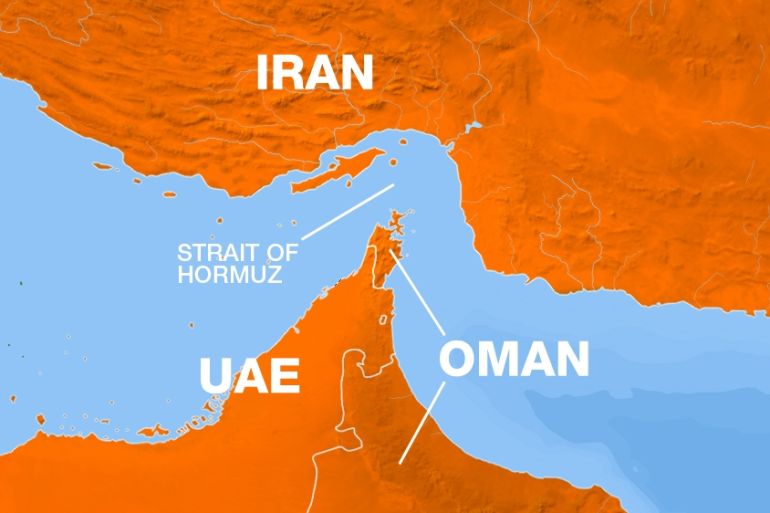US to launch plan for ‘free passage’ of ships in Iran’s waterway
US official says new initiative will seek to ensure ‘free, open passage’ for ships passing through the Strait of Hormuz.

Aspen, Colorado – The United States is concerned that a “miscalculation” by Iran could cause an “unintended conflict” in the Gulf, as it prepares to launch a new surveillance and intelligence initiative with its allies to ensure “free and open passage” for ships.
“We are starting a concept called Sentinel in which we will have a series of countries engaged to preserve the free and open passage of commerce in the Strait of Hormuz and in the Persian Gulf,” US Under Secretary of Defense for Policy John Rood said at the Aspen Security Forum on Saturday.
The US has had discussions with NATO allies, some “partners in the Gulf” and others to join the effort to keep the “vital waterway” open, said Rood, adding that the new operation would “come into being over the coming days and weeks”.
“The idea is to have additional sentinels being able to observe activity in the Gulf with intelligence and surveillance assets, having a naval and air presence to restore stability and also having capability to respond”.
|
|
Rood said the US did not want a conflict with Iran, but warned the Islamic republic should not doubt the resolve of the US to protect is forces and people.
“The potential for miscalculation is high on the Iranians’ part. They are taking steps as they did with the seizure of the vessel from the UK. This kind of friction in a small waterway increases the possibility of unintended conflict.”
Rood cited “a longstanding set of concerns about Iran’s behaviour, its export of militancy, its support for terrorism, arbitrary detention of Americans, pursuit of nuclear capabilities, long-range missiles” as reasons the US is moving against Iran.
Another US official said sanctions on Iran have been working.
US Under Secretary of the Treasury for Terrorism and Financial Intelligence Sigal Mandelker said the Iranian military were among those feeling the pressure of the sanctions.
“What you are seeing today is historic lows in the amount of oil Iran is able to produce,” and that denies Iran the revenue to build its nuclear programme, or support the Lebanese movement Hezbollah or Yemen’s Houthis, said Mandelker.
She said US President Donald Trump and Secretary of State Mike Pompeo have repeatedly said they are willing to negotiate with Iran.
Tensions in the Gulf are high, with fears that the US and Iran could stumble into outright military conflict.
Washington has blamed Tehran for a series of attacks since mid-May on shipping around the Strait of Hormuz, the world’s most important oil artery. Tehran rejects the allegations.
Washington has also announced it will send more than 500 US troops to Saudi Arabia, as well as aircraft and air defence missiles. The deployment will be the first to Saudi since the US’s withdrawal from the kingdom in 2003.
|
|